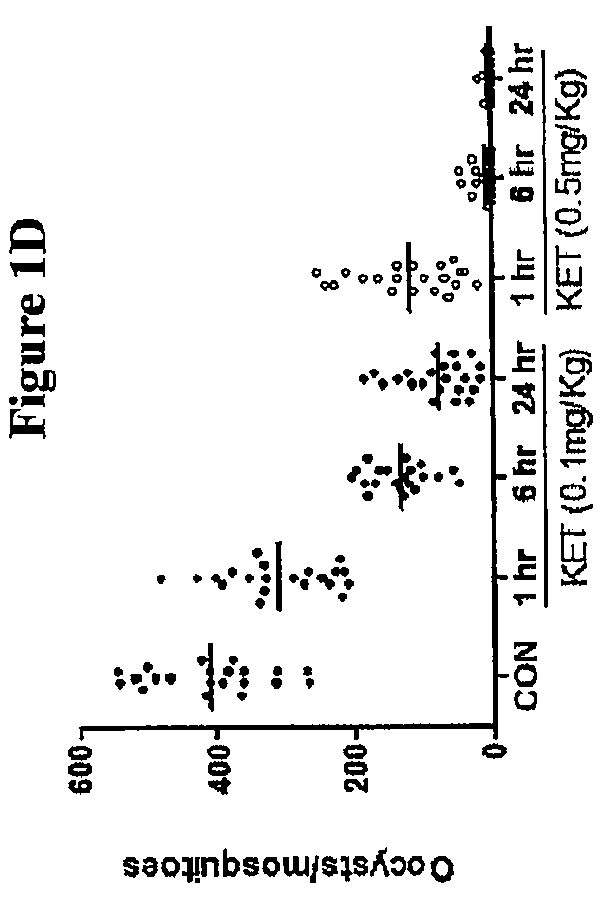Compounds that treat malaria and prevent malaria transmission
a technology of compounds and malaria, applied in the field of therapeutic compounds, can solve the problems of increasing resistance to existing anti-malarial drugs, serious side effects, and inability to provide vaccines, and achieve the effect of eliminating or preventing infection in a mammal, and preventing or slowing the transmission of plasmodium organisms
- Summary
- Abstract
- Description
- Claims
- Application Information
AI Technical Summary
Benefits of technology
Problems solved by technology
Method used
Image
Examples
example 1
Screening of Bioactive Compounds Using a Plasmodium Proliferation Assay
[0087]P. falciparum proliferation was tested within infected erythrocytes against the LOPAC-1280 collection of known bioactives (Sigma-Aldrich: sigmaaldrich.com / chemistry / drug-discovery / validation-libraries / lopacl280-navigator.html) by a qHTS 10 of a SYBR DNA binding assay (Plouffe D, et al. In silico activity profiling reveals the mechanism of action of antimalarials discovered in a high-throughput screen. Proc Natl Acad Sci USA 2008;105:9059-64.). The P. falciparum lines used in this study have been described previously (Mu J, et al. Multiple transporters associated with malaria parasite responses to chloroquine and quinine. Mol Microbiol 2003;49:977-989). The SYBR Green viability assay was adapted from methods described previously (Plouffe D, et al. In silico activity profiling reveals the mechanism of action of antimalarials discovered in a high-throughput screen. Proc Natl Acad Sci USA 2008;105:9059-64; Kato...
example 2
Discovery of Potential Antimalarial Compounds
[0088]Screens of the seven parasite lines revealed a large number of consensus actives (active in both replicates or active in one replicate and inconclusive in the other), all of which inhibited parasite growth. Among the 1,279 compounds tested, about 20% to 30% were active in most lines except W2, where 40% were active, and D10 and Dd2, where 19% and 15% were active, respectively. Of the hundreds of inhibitors identified for each line, about 50% or more showed IC50 values between 1 and 10 μM and 6% to 14% had IC50 values less than 1 μM. There were 155 compounds that inhibited growth in all seven lines tested. The potency distribution of these pan inhibitors indicated differences in sensitivity between the lines; W2 was most sensitive, with 32% of the compounds having IC50 values of 1 μM or less, while Dd2 was least sensitive with 7% below 1 μM. We identified 25 potent compounds that inhibited proliferation in all parasite lines at lower...
example 3
Discovery of Plasmodium Gametocytocidal Compounds
[0089]2,816 FDA approved drugs were screened against two Plasmodium falciparum parasites, one producing functional gametocytes and the other producing no gametocytes, and identified approximately 41 compounds that showed differences between the two parasites (5 folds differences in IC50) in response to the drugs.
[0090]For testing transmission-blocking activity in vivo, CD-1 strain female mice, aged 6-8 weeks old, were infected intra-peritoneally (i.p.) with 5×106 P. yoelii nigeriensis. In a preliminary experiment, on day 3 post infection the animals were administrated i.p. a single dose of tricyclic antihistamine and antidepressants (TAA) compound or pharmaceutical-grade phosphate buffer saline (pH 7.4). Starting 1 hr after the administration of the TAA compound, the animals were anesthetized and brought into contact with a colony of Anopheles stephensimosquitoes. The mosquitoes were allowed to feed on the mice. Unfed or partially eng...
PUM
| Property | Measurement | Unit |
|---|---|---|
| diameter | aaaaa | aaaaa |
| body weight | aaaaa | aaaaa |
| w/w | aaaaa | aaaaa |
Abstract
Description
Claims
Application Information
 Login to View More
Login to View More - R&D
- Intellectual Property
- Life Sciences
- Materials
- Tech Scout
- Unparalleled Data Quality
- Higher Quality Content
- 60% Fewer Hallucinations
Browse by: Latest US Patents, China's latest patents, Technical Efficacy Thesaurus, Application Domain, Technology Topic, Popular Technical Reports.
© 2025 PatSnap. All rights reserved.Legal|Privacy policy|Modern Slavery Act Transparency Statement|Sitemap|About US| Contact US: help@patsnap.com



